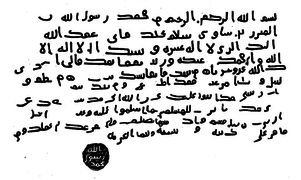Islam in Bahrain
Islam is the state religion in Bahrain. Due to an influx of immigrants and guest workers from non-Muslim countries, such as India, the Philippines and Sri Lanka, the overall percentage of Muslims in the country has declined since the late 20th century. Bahrain's 2010 census indicated that 70.2% of the population is Muslim.[1] Although the country is majority-Shiite, the al-Khalifa monarchy is Sunni.[2]
History
Prior to Islam, the inhabitants of Qatar and Bahrain practiced Arabian paganism, worshipping idols. Islam swept the entire Arabian region in the 7th century. Muhammad sent his first envoy Al-Ala'a Al-Hadrami to Munzir ibn Sawa Al Tamimi, the ruler of the historical region of Bahrain, which extended the coast from Kuwait to the south of Qatar including Al-Hasa, Qatif, and the Bahrain Islands, in the year 628 AD, inviting him to Islam. Munzir announced his conversion to Islam and all the Arab inhabitants of Bahrain and Qatar including some Persians living in Qatar also became Muslim, heralding the beginning of the Islamic era in Bahrain.

The Ismaili Shia sect known at the Qarmatians seized Bahrain in 899 CE, making it their stronghold and base of operations. They raided Baghdad and in 930 sacked Mecca and Medina, desecrating the Zamzam Well with the bodies of Hajj pilgrim and taking the Black Stone with them back to Bahrain where it remained for twenty years. The Qarmatians were eventually defeated by their Ismaili counterparts, the Abbasids in 976 and afterwards their power waned.
The defeat of the Qarmatian state saw the gradual wane of their revolutionary brand of Ismaili Islam. Instead, under a process encouraged by Sunni rulers over the next four hundred years, Twelver Shia Islam became entrenched. According to historian Juan Cole, Sunnis favoured the quietist Twelver branch of Shi'ism over the Qarmatians and promoted its development in Bahrain.[3] In the 13th Century, there arose what was termed the 'Bahrain School', which integrated themes of philosophy and mysticism into orthodox Twelver practise. The school produced theologians such as Sheikh Kamal al-Din Ibn Sa’adah al Bahrani (d. 1242), Sheikh Jamal al-Din ‘Ali --- ibn Sulayman al-Bahrani (d. 1271), and perhaps most famously Sheikh Maitham Al Bahrani (d. 1280).[4]
Today
There are no official figures, but it is estimated that 60-70% of the Bahrainis follow the Shia Jafari (Twelver) school, with the remaining third following different schools of Sunni Islam. The Al Khalifa ruling family and its supporting tribes adhere to the Sunni Maliki school of Islamic jurisprudence that was spread by the Uyunid dynasty, which came by the command of Sheikh Abdullah bin Ali Al Uyuni, while the Huwala Sunnis follow the Shafi'i school. There is also a large population of the South Asian Sunni Muslim residents who follow the Hanafi school and also some following the Shia Jafari school from South Asia.
The country observes the Muslim feasts of Eid al-Adha, Eid al-Fitr, the Prophet Muhammad's birthday (Mawlid), and the Islamic New Year as national holidays.
Political liberalisation under King Hamad has seen Islamist parties contest Bahrain's elections and become a dominant force in parliament. Sunni Islamist parties, the salafist Asalah and the Muslim Brotherhood affiliated Al-Menbar Islamic Society are two of the largest parties in parliament, while the Shia Islamist Al Wefaq was expected to become the dominating party after 2006's general election having boycotted the 2002 poll. In the 2006 election Wefaq received the backing of the Islamic Scholars Council which helped it seventeen of the eighteen seats it contested. In the 2010 election, they increased their representation by one seat, winning all the constituencies they contested, to take 18 of the 40 available parliamentary seats.[5]
See also
References
- ↑ "General Tables". Bahraini Census 2010.
- ↑ "Bahrain Drain". Foreign Affairs. Retrieved 16 November 2015.
- ↑ Juan Cole, Sacred Space and Holy War, IB Tauris, 2007 pp32
- ↑ Ali Al Oraibi, Rationalism in the school of Bahrain: a historical perspective, in Shīʻite Heritage: Essays on Classical and Modern Traditions by Lynda Clarke, Global Academic Publishing 2001, p. 331
- ↑ Independents the biggest winners - Gulf Daily News, 1 Nov 2010
External links
- Conspiring Against the Shia of Bahrain, Bahrain Center for Human Rights, October 2006
- Discrimination in Bahrain: The Unwritten Law, Bahrain Center for Human Rights, September 2003
- Video: Political Naturalization in Bahrain (2002)
- At least Bahrain is trying to address Sunni-Shiite divisions, Daily Star editorial, 12 May 2006 (from Bahraini.tv website)

